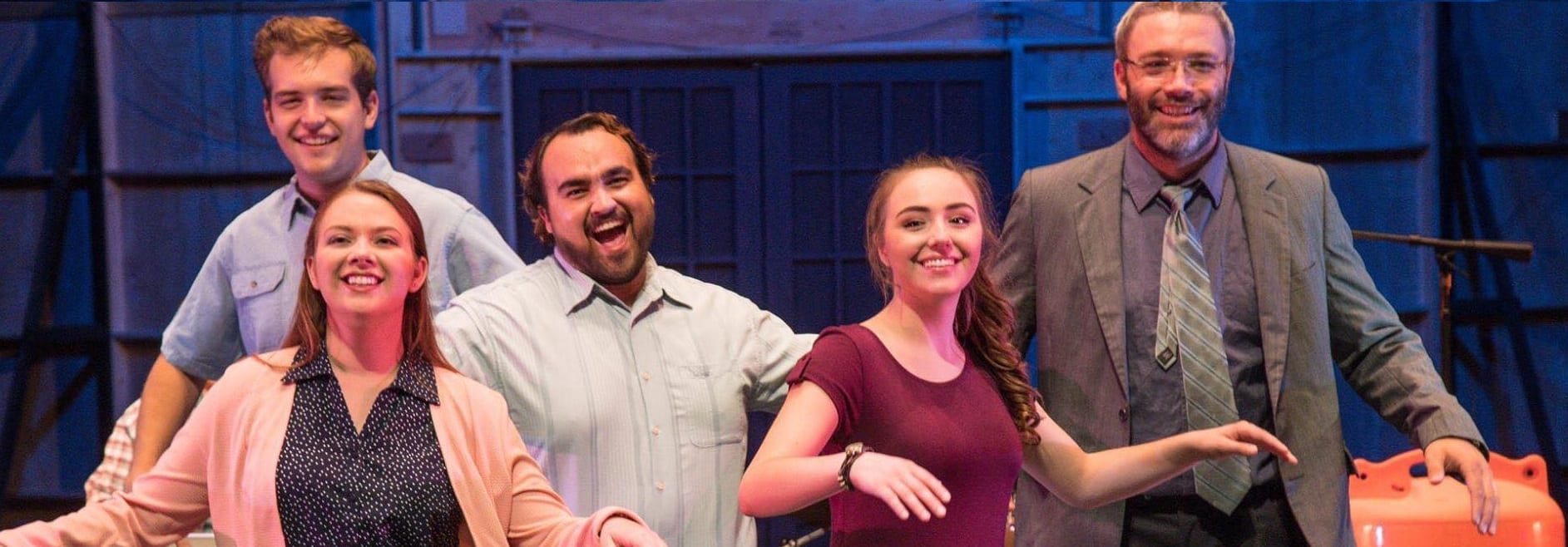CEDAR CITY — Under Construction by local theatre artist Peter Sham is a fun and energetic musical about the people most audiences never think about in the theatre: the set construction crew. They build things and make repairs and keep things ship shape, but when we’re watching a finished production they’ve already done their work and we forget all about them. So here’s a musical all about those hard-working crews who make plays possible. The show features a crew of four construction workers who become the live band for the impromptu musical. The foreman of the crew joins the theatre manager, her assistant, and two “members of the audience” to form an impromptu cast for an improvised musical.

The execution of the show was fantastic, with excellent casting choices by directors Douglas Hill and Peter Sham, wonderful cast chemistry, a talented band that played together perfectly, and a minimalist but interesting set. The cast was fantastically talented and fun to watch, I really enjoyed each of them in their roles. But the show stopper was Lydia Field who played Fred the drummer. I would have liked to see even more of her skills. Betsy, who was played by Olivia Sham, had an especially amazing voice. I can only imagine that she has a fantastic career ahead of her, should she choose to chase it.
Despite these advantages, the show could not overcome its inferior script. The musical numbers were in many different styles but they flowed together easily. The variety in style was fun and exciting without being distracting. If this play gains traction and popularity I imagine many of these songs will be popular for auditions and musical reviews. However, if Under Construction is going to gain any serious popularity, it’s going to need to drag itself up into the 21st century. The depiction of the two female characters that are written into the script (Fred the drummer is written as a male character) is highly problematic. Janine the theatre manager (played by Jordyn Aspyn) was labeled as “trouble” and “not a good person” because she had sex with someone. It doesn’t matter that she’s kind, talented, funny, and very good at her job. What makes her a bad person is having sex. It’s 2017, people. Women have sex. For her story to be about being broken and unworthy of someone like foreman Don (played by Christopher Whiteside) because she has past partners is an idea that belongs in an episode of The Andy Griffith Show, not a brand new play. Women who have sex (which is how the human race has managed to not die out, by the way) are not bad news and do not need to be redeemed by the benevolent attention of some guy. But only after he makes sure she knows what she’s done is shameful, of course.

The only song that the women sing together is about how their past boyfriends have been terrible and that they need something different now. They commiserate and hug and dance together, all while the colors of the bisexual pride flag were splashed all over the backdrop of the stage. I thought we were about to have a bit of queer inclusion and have the women realize they could be happy together, that their close friendship could be escalated to romance. But I was to be disappointed. They have another intimate moment of emotional connection later in the play, and again the pink, purple, and blue of the bi flag shone brightly behind them. But again, no such luck. I’m certainly not saying that every show needs a LGBTQ love story. Just don’t tease me like that.
The inciting incident for the show is that Betsy made a mistake when scheduling the theater. Instead of being an honest mistake, Betsy is depicted as so crazy she spent time in a mental hospital. Another character openly mocks her for being crazy. She’s diagnosed with “involuntary automatism,” for which I can find no information outside of legal usage in criminal defense cases. I even checked with a licensed psychiatrist and this is not a diagnosis. There’s no need whatsoever for Betsy’s mistake to be caused by such an illness, especially when that leads to the very flippant discussion of seeking treatment.
I genuinely believe that this show could become amazing and have many future productions. It can be played with the cast of five backed by the bare-bones band of four, or the band could be expanded to a huge crew of musical construction workers. The songs are fun and utilize the whole cast well, and it could be very successfully produced by a junior high or a professional theatre. But the theatre crowd is a pretty liberal one, so the script just must be updated if it’s going to make it very far.
[box]The Neil Simon Festival production of Under Construction plays various dates at either 2 PM or 7:30 PM through August 12 at the Heritage Theater (105 North 100 East, Cedar City). Tickets are $10-25. For more information, visit simonfest.org.[/box]
